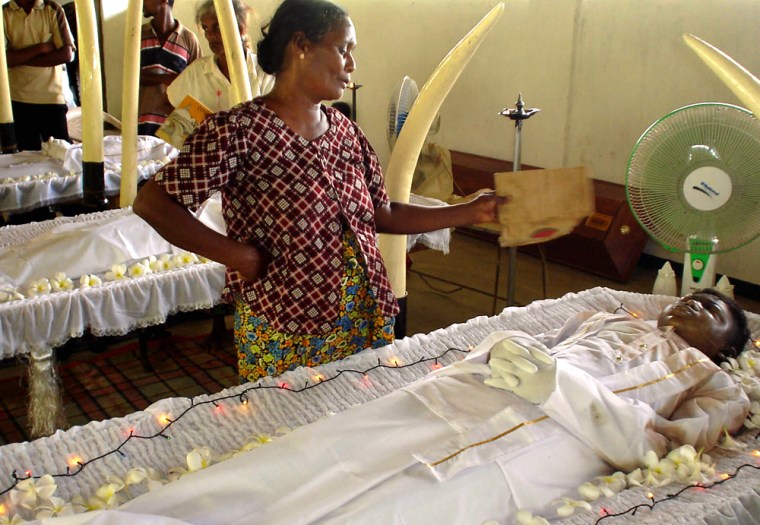A bomber pretending to be pregnant talked her way into a military complex Tuesday, then blew herself up in front of a car carrying the Sri Lankan army commander, killing eight people and wounding the officer and 26 others.
Government warplanes quickly struck at areas held by the Tamil Tiger rebel movement in a new round of escalating violence that threatens to shred a 4-year-old truce in the island’s civil war.
“This attack is yet another blow to the cease-fire agreement and the peace process,” European monitors warned after the suicide bombing.
Neither government officials nor the rebels spoke about the state of the truce, but tensions have been worsening along with violence that has killed at least 89 people, including 43 soldiers or police, just this month.
The rebels accuse the Sinhalese-dominated government of discriminating against minority Tamils and want a separate homeland on the island, which lies off India’s southern tip. Before the 2002 truce stopped large-scale fighting, more than 65,000 people died in two decades of war.
Rebels withdraw from talks
Last week, the rebels backed out of peace talks that had been scheduled to start Monday in Geneva, citing attacks on Tamil civilians and other disputes with the government.
No one claimed responsibility for Tuesday’s attack on Lt. Gen. Sarath Fonseka, but the rebels have a history of using suicide bombers.
President Mahinda Rajapakse, whose government blamed the bombing on the Tamil Tiger rebels, took a defiant stance in a televised address Tuesday night.
“I can’t be scared by any mode of terrorism,” Rajapakse said. “Similarly, my government can’t be brought to its knees by any kind of challenge.”
The bomber reportedly disguised herself as pregnant to conceal the explosives used to strike at Fonseka inside the military headquarters in Colombo, the capital.
She entered the grounds by presenting fake identification and saying she had an appointment for a checkup at the army hospital inside the complex, said military officials, who insisted on speaking anonymously because of regulations.
‘I saw a fireball’
Once inside, she triggered an explosion near a car carrying Fonseka, a veteran of 35 years in the infantry who was appointed army commander after Rajapakse became president in November. The bomber died instantly, but it wasn’t clear if she was included in the government’s figure of eight dead.

“I saw a fireball as I came out of my saloon,” said S.A. Weerasinghe, who works in the military saloon inside the sprawling complex.
Fonseka was in stable condition after undergoing surgery for abdominal injuries, said an army spokesman, Brig. Prasad Samarasinghe. The 26 other wounded included the general’s driver and escort and several civilians, he said.
Rebels move on Trincomalee
Hours after the bombing, witnesses reported that military planes and mortars struck at rebel positions near Trincomalee, an important port 135 miles northeast of Colombo.
A senior official said the air attacks were ordered after rebels were detected moving toward the port, which is a major Sri Lankan navy base. The official, who agreed to discuss the matter if not quoted by name because he wasn’t authorized to speak to journalists, said the airstrikes were meant only to deter any rebel attempt to capture the harbor.
A Tamil Tiger spokesman also said government planes attacked rebel areas.
“There are still attacks going on,” S. Elilan said by telephone from Trincomalee. “There is no way we can get out even to check the casualties the situation is so bad. We have not hit back yet but we will be compelled to do so if the attacks go on.”
